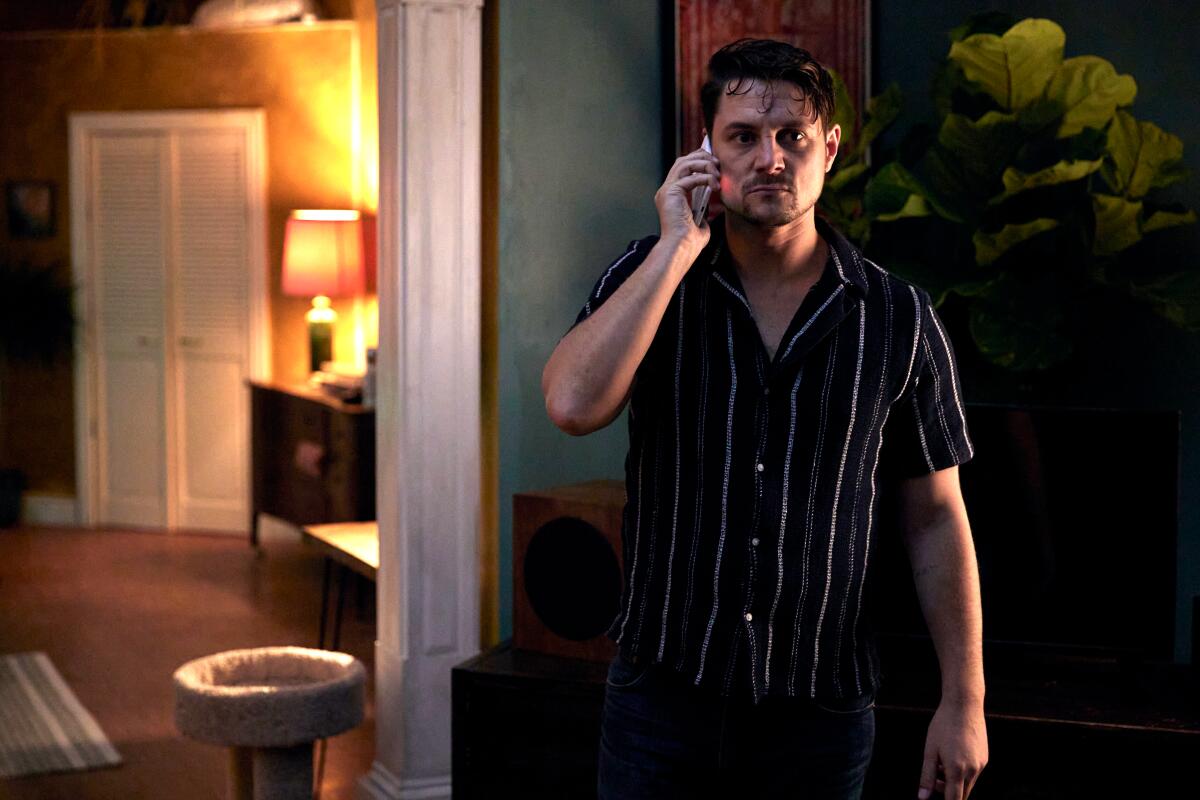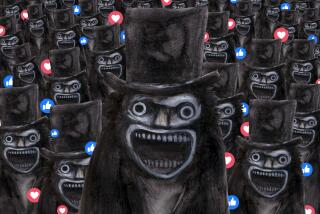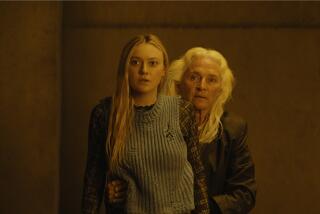Review: Based on a viral Twitter thread, ‘Dear David’ makes for vapid ‘content,’ not a real movie

- Share via
It’s not just books that can be adapted into films these days — the biggest movie of the year is based on a toy. Even Twitter (or now, X) threads have been optioned into screenplays, such as the rollicking 2021 film “Zola,” a wild ride directed by Janicza Bravo depicting the events recounted in a Twitter thread written by A‘Ziah “Zola” King.
And this spooky season comes another Twitter-thread-inspired movie, “Dear David,” based on the events recounted by artist and writer Adam Ellis that had readers on the edge of their smartphones for over a year. Ellis updated the thread and his accompanying BuzzFeed articles with developments about a supposed haunting in his apartment, including photos, videos, sound recordings and his own drawings.
Obviously, it was scooped up right away for adaptation, but the resulting horror flick, written by Mike Van Waes and directed by John McPhail, is a dim and dismal affair that misses what makes this story horrifying by about a mile. Augustus Prew stars as Adam Ellis, and his performance is mostly relegated to staring at his smartphone in the dark, doomscrolling alone in his apartment. The true jump scare in “Dear David” would be the reveal of Adam’s screen time.
Set in 2017, “Dear David” is a period piece, taking us back to a time when listicles ruled and every internet writer was trying to be “relatable AF.” Enter the true villain of the film, BuzzFeed head honcho Bryce, Adam’s boss, who is naturally played by Justin Long, whose smarmy delivery about views and engagement is far more terrifying than any kiddie ghost (ironically, BuzzFeed CEO Jonah Peretti is a producer on the film, as Ellis was working at BuzzFeed at the time and documenting his experience on the site with articles headlined “My Apartment is Being Haunted by the Ghost of a Dead Child”).
Adam looks up from his phone every now and again and starts to see a chair in his apartment rocking of its own free will; his cats gather at the door and yowl. He’s tormented by horrible sleep-paralysis hallucinations, and ultimately moves into a new apartment in hopes of escaping these episodes, but they only follow him into his daily life. All the while he chronicles the experience on Twitter, replying to trolls, pressured into churning out more viral content for Bryce, at the threat of losing his job in an ever-churning media landscape.
“Dear David” could have been an existential indie about the “content-ification” of our personal lives, and the damage wreaked by sites like BuzzFeed on the digital news landscape. Instead, it is a boring paint-by-numbers ghost movie, a jumble of tropes borrowed from movies like “The Ring,” and a poor facsimile of its influences. But those digitally rendered spooks have nothing on scenes where the carefree bloggers gossip about employment turnover over drinks. Bryce is the real big bad, but Long is woefully underutilized.
McPhail, who directed the delightful Christmas zombie high-school musical comedy “Anna and the Apocalypse,” has left all sense of whimsy, humor and creative innovation behind when it comes to “Dear David.” His truly dreadful latest film lacks both artistry and insight; with its cheap digital cinematography and janky computer-generated graphics, this hastily cobbled-together attempt to ride the coattails of a 5-year-old viral success isn’t a movie, it’s “content.”
Katie Walsh is a Tribune News Service film critic.
'Dear David'
Rating: R, for violent content, language and a sexual reference
Running time: 1 hour, 34 minutes
Playing: Lumiere Cinema, Beverly Hills
More to Read
Only good movies
Get the Indie Focus newsletter, Mark Olsen's weekly guide to the world of cinema.
You may occasionally receive promotional content from the Los Angeles Times.










